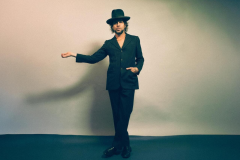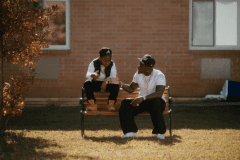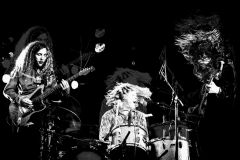Ryan “Cowboy Ryan” Koenig is a country music devotee. Whether he is on the road with his full-time gig as a multi-instrumentalist with Pokey LaFarge, or at home inside western themed trinket-covered walls of his St. Louis bungalow, you will most likely find him affectionately immersed in the genre’s fashion, history, and culture.
Koenig’s debut album, Two Different Worlds, is an expression of his love of country music as well as a reflection of the deep understanding and appreciation he has for even the smallest piece of the country music puzzle. His songs touch upon gentrification, mortality and the dichotomy of romance and violence, which are interspersed throughout classic country tales of heartbreak and longing. Two Different Worlds also includes contributions from the strongest musical voices in roots music, including John Horton (The Bottle Rockets), Gary Hunt, Jr. (Son Volt), various members of Pokey LaFarge’s backing band, and a host of Big Muddy Records regulars including Jack Grelle and Koenig’s wife, Kellie Everett (The Hooten Hallers). This multitude of talent coalesces into a colorful palette that brings Koenig’s rich and textured vision of country music to life.
Much of the world has already been fascinated with his ability to captivate as a supporting musician and soloist. The release of his debut full-length gives the world its first true glimpse of Koenig’s potential to dazzle and enchant, and a preview of what lies ahead.
Ghettoblaster recently caught up with Koenig who provided a track-by-track explanation of the record, which was released October 13. This is what he told us.
“Miss Edie”
An almost entirely fictional story based on a real person and real events. Edie Fox is an English woman, and I first met her at a Pokey [LaFarge] show in Oxford. She was extremely stylish and immediately noticeable. A little while later after I returned to the states she contacted Big Muddy Records asking to buy one of my CDs, and if I could maybe just bring it with me next time I came to England to save shipping. I was charmed by this, as it took a bit of homework to find my homemade records online. I delivered the CD to her in Nottingham, and we became friends.
The song is in reference to the first time we crossed paths in the states. She showed up in Bowling Green, Kentucky at a Pokey/Deslondes show. She had been in Knoxville, had made it to Nashville and then hitch-hiked up to Bowling Green in a beautiful blue bonnet colored leather fringe jacket. We wound up at Tidball’s bar, and the next day she was getting a greyhound to Dallas on borrowed money to see Hooray For The Riff Raff play.
It all seemed like such a fairy tale story to me: this super stylish English woman, bumming her way across middle/southern America, hitchhiking out of Nashville, getting all the way to Texas on a greyhound, that’s the kind of stuff you write country songs about, especially because she brought me a bottle of Bourbon!
Problem is, it never happened. I ran into Edie and Jack Broadbent in Newcastle later on, and without mentioning the half-finished song, I asked about her trip to Dallas. She never made it to Dallas, she never even got on the greyhound. She went back to Knoxville, and then she went home to the English countryside. Whether or not Edie has ever made it to Dallas since, I don’t know. I’ll have to ask her the next time we cross paths.
“Strugglin’ With A Lot”
This song is for my friend Chelsea Voelker in Knoxville, Tennessee. She is a hard working woman with a huge heart and an unbelievable amount of patience and compassion for everyone and everything on earth, yet every time I see her she seems to be pushing against an immovable stone. This song is all references to specific stories of hers and those around her. She was wearing a denim and lace dress when the song came to my mind. Her longtime friend Jack Herranen described Knoxville as full of “knots” that the hardworking people must get themselves out of.
Chelsea loves her little farm that’s situated on a little stream outside of town. She has grown peanuts and tobacco among other things. Some of her neighbors are junkies and stole one of her goats. The neighborhood in Knoxville she works in and loves, Vestal, is famous for logging and marble. Whether Chelsea is feeling chopped up and knocked down or solid and polished, she is beautiful in her resilience.
“The Old Main Drag is About to Drag Me Down”
This song is about many feelings I have in and about my hometown of St. Louis. Is it a ghost town? Many would say so. On a cold winter night at the corner of Cherokee and Ohio when I am the only one on the street, I’m inclined to agree. Does it have a voice all its own? Well of course, but often no one seems to hear it. Many people only see it as a waiting room for Chicago, or the coasts. There’s many hardships, perhaps more than many of us are even willing to admit. Maybe these are the reasons I love it so much.
What started as a catchy piece of wit about drinking on Cherokee ended up as a critique of my city and self. The OLD main drag. The bustling night spot that will still never return to its former glory, no matter how many people seem to keep showing up. The street where most of the people I see are the same people I’ve been seeing for 10 or more years, no matter how many people seem to keep showing up. Maybe like this street, like this city, we’re past our better days, clinging to each night like a chance to be young again, just chasing a dream that’s only becoming less realized with each passing year. We wear it on our faces, the look of a people trapped by a map laid out by our wealthy forefathers so that they could take the money and run. Run to the county, run to Chicago, run to the coasts. I’m tired of chasing them, so let’s just have a drink on the old main drag.
“Podemos Si Te Quieres”
One of my first entirely fictitious songs. Jack Grelle came back from South America with this phrase, so it may not be common in Mexico, but Mexico fits the fiction. It means “we can if you want to.” Jack asked me to write a song with the phrase and it came to me surprisingly quick, while I was mowing the grass. “We can if you want to” seemed suggest a casual encounter with a sad back story, perfect for border country.
“Am I Still In Your Heart (Or Am I Just In Your Way)”
This song, like “Old Main Drag” and “Podemos,” started with just the title. I was convinced the song already existed, so when I could find no evidence of that, I decided I needed to write it. Not really based on any particular situation in my life, but more on a general feeling of waning love and the suspicion surrounding it. Someone clearly trying to look their attractive best, and it might not be for you anymore.
“Cheyenne”
There are many things that we must leave behind in life: people, places, times. There are many ways we leave them behind: physically, mentally, spiritually. Sometimes all of these things and ways seem to wrap up into one, and this song is about that. It is a timeless western scene playing out in the mind and heart, with blurred lines between character, place, and action.
“It Don’t Matter”
The only cover on the record, this song was written by Bob Reuter, musician, photographer, writer, DJ, and friend. Bob passed away in 2013 when he accidentally fell down an elevator shaft. He was always a hero and mentor to many of the Big Muddy Records family and to St. Louis musicians in general. He also had the heart of a teenager in the body of a grown man, which made him very dramatic and hard to deal with. Constantly pushing his luck, never understanding why he wasn’t getting his way, he burnt many bridges, and sometimes it seemed like I was the only one that always forgave his bad behavior. That was Bob for you though. He was the kind of guy who would invite you out to dinner, and then tell you he didn’t have any money, which was not a lie. Bob saw every kind of hard time and trouble you could imagine, which made him a creative outlet for the spirit of St. Louis. He was full of stories, and you can hear these stories in his songs and see them in his photographs.
The first time I heard him sing the first verse of this song, I thought it was about me. It is definitely not, and was probably written when I was a toddler, but that’s the way Bob’s songs can make you feel. The verse is not included on some of Bob’s recordings of this song, so I felt obligated to include it, and this song, as a tribute to my friend. Also upon recording this song I realized how closely it fit the rest of the album. Travel, love, loss, St. Louis, Texas, introspection. So in a way, it was about me.
“Easy to See”
As my buddy Graham Kennedy puts it, this is some “lay down and die country”. This one is entirely personal and all true. Dealing with a dying love that you are killing. Watching the one you love slip further away every time you leave town. Knowing it hurts her at least as much as it hurts you, if not more. It’s obvious to everyone and there’s nothing that can be done. At some point a “ragged old shirt” is just a rag, and a “ghostly old tree” is just dead wood.
“Puebla, Mexico”
This song is about some dichotomies I experienced in the late summer and early fall of 2014. Having returned from tour into the atmosphere of an immediate post-Ferguson St. Louis, I was somewhat unprepared for the gravity of the situation that would leave our city more openly divided than I had previously experienced amongst people I knew and love. Politically, St. Louis has always been divided along racial lines, with the white wealthy and elite all too often being noticeably victorious over the poor, especially the African American poor. The death of Michael Brown was one in a long line of tragedies I had witnessed in my life up until this point. Sometimes these tragedies are on the hands of law enforcement, sometimes on the hands of a divided community. The only thing that always remains the same is the victim. An African American friend of mine had been gunned down in his late teens during a mugging, and I could see the cycle of grief repeating itself in the family and friends of Michael Brown, and the community surrounding them. As protests and rallies and vigils ensued, I was admittedly skittish, although very frustrated. Frustrated not only with the police, but with the whole city, repeating this familiar cycle.
Then in October, another African American friend of mine, Ikey Owens, passed away in Puebla, Mexico. Not in his teens, but far too young. Not from a social/political device, but from a natural, if unexpected, cause. So now, while my city is grieving for a young, African American stranger, I am grieving for another young African American friend. It really made me think about the weight of the global versus the weight of the personal.
I had been heavily romanticizing Mexico and Mexican culture at the time, although I had never been there. I was hearing my friend Elizabeth Ramos’ Mariachi fiddle down the street from my house regularly, writing songs like “Podemos Si Te Quieres,” listening to a lot of Lydia Mendoza, Flaco Jimenez, Freddy Fender, etc. It reminded me of my times on Cherokee street growing up, the little Mexico of St. Louis.
So this song is also about the romantic versus the reality. Romantically, Mexico is a far off place full of sunshine and great food and music, but in reality, my friend is dead in a hotel room. Romantically, St. Louis is starting the revolution, but in reality, the death of innocent African Americans has been common in our streets and continues today, years later.
This song also contains many specific references. “October wind” is a reference to Bob Reuter, North St. Louis born artist who died the previous summer, who I was still grieving for heavily at the time. “Maybe one of these days I’ll make it back to California, like all Midwestern boys just seem to do” is a reference to a conversation Ikey and I had at the Newport Folk Festival, which to my memory is the last time I saw him. “They say that life don’t matter much on the north side of my city” references Ferguson and greater North St. Louis, where my other African American friend had been shot and killed, and where my dad taught school his entire career, and where Joey Glynn, Adam Hoskins, and I went to high school. “But it’s my window facing south that’s got me down” references the standard tune “My Window Faces The South” that Pokey and us were performing at the time.
“Last Resident”
This is the oldest song of mine on the record, must be almost 10 years old now. It’s about a time where I was leaving a relationship and a band, with a woman as the common factor. The verses are completely autobiographical, down to the St. Vincent De Paul guitar. The chorus is based on something Keely Kirkwood told me at the time: “Just don’t let it rent so much space in your head.”
Purchase Two Different Worlds here.







Social Media